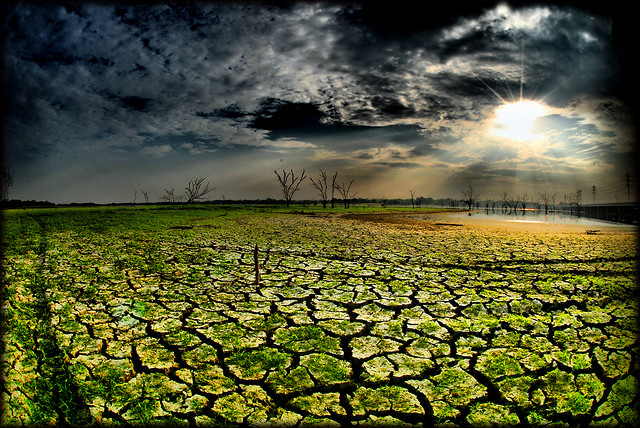Podcast: Play in new window | Download
Subscribe: RSS

As more and more of the breadbasket looks like this, tensions are rising and lawsuits are flying. (Photo by Terry Shuck/Flikr)
According to government assessments released in the past week, both near- and long-term prospects are worsening for the drought-stricken Plains and Southwest states. As hope for relief fades, tensions are rising among towns, farms and states that are acting out the Tragedy of the Commons: as their water supply shrinks, they go after their neighbor’s.
In the short term, weather forecasters see little or no drought relief for the region in the next few months. (There have been showers here and there, and although welcome they have been mere band aids on the tumor.) The lack of moisture in the ground, and snow cover on the ground, threatens the winter wheat crop that has already been planted and needs moisture in the spring to germinate. This week’s cold outbreak in the northern tier of midwestern states is a further threat to unprotected wheat and livestock.
Looking farther out, the tunnel gets darker. Last week, the National Climate Assessment Advisory Committee, a large consortium of federal agencies, released for public comment its third report on the impact of climate change. The product of a committee of 240 scientists, business leaders and other experts, it is a remarkably grim and clear-eyed document, for a government whose leaders typically refuse to mention the subject. In addition to stating, flat out, that climate change is happening and is largely the result of burning fossil fuels, the report concludes that:
- Impacts related to climate change are already evident in many sectors and are expected to become increasingly challenging across the nation throughout this century and beyond.
- Climate change threatens human health and well-being in many ways, including impacts from increased extreme weather events, wildfire, decreased air quality, diseases transmitted by insects, food, and water, and threats to mental health.
- Infrastructure across the U.S. is being adversely affected by phenomena associated with climate change, including sea level rise, storm surge, heavy downpours, and extreme heat.
- Reliability of water supplies is being reduced by climate change in a variety of ways that affect ecosystems and livelihoods in many regions, particularly the Southwest, the Great Plains, the Southeast, and the islands of the Caribbean and the Pacific.
- Adverse impacts to crops and livestock over the next 100 years are expected. Over the next 25 years or so, the agriculture sector is projected to be relatively resilient, even though there will be increasing disruptions from extreme heat, drought, and heavy downpours.
Anyone who believes the study is too alarmist, or extremist, or liberal, or whatever other pejorative comes to mind as a substitute for “fact,” should survey the newspaper headlines in local newspapers over the past few weeks. Among the stories:
- The state of Texas filed suit in the US Supreme Court claiming that New Mexico is reducing the flow of the Rio Grande into Texas, contrary to a water-sharing agreement between the states.
- Officials in north-central Oklahoma declared a state of emergency due to record-low reservoirs
- The government declared much of the central and southern U.S. Wheat Belt a natural disaster area due to persistent drought threatening the winter wheat harvest.
- The Agriculture Department made growers in Kansas, Colorado, Oklahoma and Texas eligible for low-interest emergency loans.
- In Kansas, penalties for exceeding water use limits for irrigation were doubled and Governor Sam Brownback has launched a task force to come up with strategies to counter statewide shortages.
- This month the small Oklahoma farming town of Wapanucka lost water completely when the spring-fed wells the community relies on ran dry. Officials closed schools and residents had to do without tap water until the town could run a line to a neighboring water district.
“We are not going to be the only ones who this happens to,” said the town’s water manager. “It’s coming.”
as all resources become scarce, conflict is inevitable.
words and lawsuits to begin with, but as the union is held together by mutual reliance on basic infrastructures, and overall financial constraint.
these will inevitably disintegrate, and with no recourse to civil law, the law of the frontier will replace it.
It’s happened before, when Owens Lake was drained to irrigate California, the locals blew up the dam infrastructure to prevent it (around 1920 I think)
fighting over every resource is inevitable, water is just the start of it, there are similar flashpoints across the world.
We can compromise to a certain degree on what we eat, but water is non negotiable. 3 days without it and you’re dead.
The scary thing about water is, that unlike energy, there are no real alternatives. Unless, of course, we embark on very costly projects like massive desalinization or–heaven forbid–some misguided bureaucrat or private company decides it’s a good idea to suck fresh water out of places like the Great Lakes and pipe it to our dry farmlands and urban areas. So the real frustration for most alarmed citizens is finding fairly immediate solutions because things like addressing climate change and farming practices are very long term propositions. And, apparently, we don’t have the luxury of time on our side. I am just wondering what the currently thinking is to address the issue in a serious and practical way?
It’s a very good question. I am not aware of any answer, especially since you chose the highly restrictive terms “serious” and “practical.”